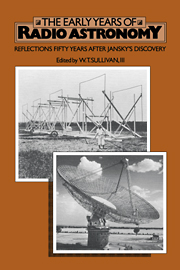Summary
In the decade following World War II radio astronomy evolved from a minor curiosity to a strong scientific discipline, from small groups of equipment-oriented radio physicists and electrical engineers to major laboratories whose tenor was as much astronomy as radio techniques. This evolution took place in a similar fashion in many countries, but there were two nations where radio astronomy especially flourished. These were England and Australia. While it is not surprising to find England at the forefront of a scientific field in the middle of the twentieth century, Australia's presence requires more explanation.
The main elements in the Australian success story emerge from the articles in this section, by five of the key participants. First, the Radiophysics Laboratory in Sydney had in fact very close ties to the mother country and her strong tradition in radio science — many of the staff members were originally British or trained in Britain. Second, the Laboratory had been at the forefront of radar development during World War II and, when the war ended, was not dissolved. Rather, the strong team was kept intact under CSIRO aegis while new recruits and directions for peacetime radio research were sought. Third, dynamic and wise leadership was provided by “Taffy” Bowen and Joe Pawsey — two men whose contrasting personalities and styles of science led to just the right mix for exploring and exploiting the most profitable avenues into the radio sky.
- Type
- Chapter
- Information
- The Early Years of Radio AstronomyReflections Fifty Years after Jansky's Discovery, pp. 83 - 84Publisher: Cambridge University PressPrint publication year: 1984



